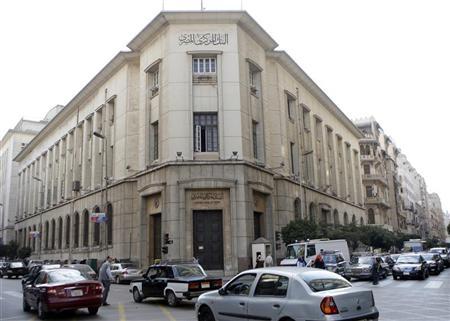Latest NEWS
- Aswat Masriya, the last word
- Roundup of Egypt's press headlines on March 15, 2017
- Roundup of Egypt's press headlines on March 14, 2017
- Former Egyptian President Hosni Mubarak to be released: lawyer
- Roundup of Egypt's press headlines on March 13, 2017
- Egypt's capital set to grow by half a million in 2017
- Egypt's wheat reserves to double with start of harvest -supply min
- Roundup of Egypt's press headlines on March 12, 2017
Egypt central bank keeps interest rates on hold

Central Bank of Egypt -Reuters
CAIRO, May 29 (Reuters) - Egypt's central bank left key interest rates unchanged on Thursday, a day after Egyptians voted to elect former army chief Abdel Fattah al-Sisi as president, as it tries to balance growth and inflation pressures.
The central bank kept the overnight deposit rate and the overnight lending rate at 8.25 percent and 9.25 percent, respectively, it said in a statement on Thursday.
Growth has been sluggish for three years in the Arab world's most populous country as tourists and foreign investors have stayed away in the wake of the popular uprising that ousted autocrat Hosni Mubarak in 2011 and the political turmoil that has followed.
Three of the six economists Reuters spoke to had expected the bank to cut its benchmark rates by either 25 or 50 basis points to give economic activity a boost.
The other three forecast no change in rates. As well as high inflation, a tumbling Egyptian pound has pressured the central bank to keep interest rates high to lure funds out of foreign currencies.
"The downside risks to domestic GDP combined with the negative output gap since 2011 will limit upside risks to the inflation outlook," the central bank said in a statement on its website.
"Given the mixed balance of risks surrounding the inflation and the GDP outlooks at this juncture, MPC (the Monetary Policy Committee) judges that the current key CBE rates are appropriate," it added.
The central bank kept its deposit and lending rates unchanged at its last meeting as well, on April 28.
Economic growth has been sluggish this year, with gross domestic product only rising 1.2 percent in the first half of 2013/14. The government has cut its growth forecasts for this year to 2-2.5 percent from a previous 3-3.5 percent.
The annual consumer inflation rate slowed to 8.9 percent in April from 9.8 percent in March, while annual core inflation slowed to 9.11 percent in April from 9.9 percent in March.
To support the local currency, the central bank has also been burning through its foreign currency reserves, now at around $17 billion compared with around $35 billion before the 2011 uprising. (Reporting by Asma Alsharif; Editing by Hugh Lawson)










